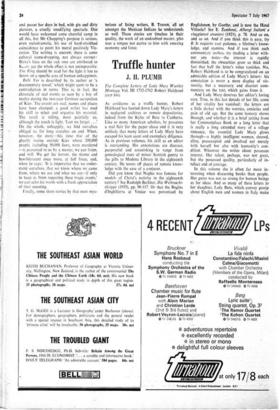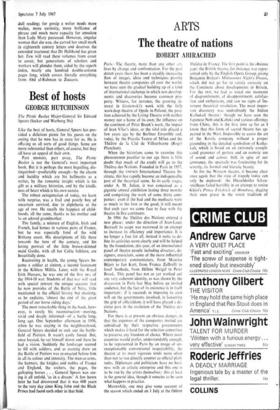Truffle hunter
J. H. PLUMB
As assiduous as a truffle hunter, Robert Halsband has hunted down Lady Mary's letters in neglected archives or remote depositOries, indeed from the Kyles of Bute to Canberra. Like so many American scholars, he possesses a real flair for the paper chase and it is very unlikely that many letters of Lady Mary have escaped his keen scent and exemplary diligence. As in previous volumes, his skill as an editor is outstanding. His annotations are discreet, purposeful and astonishing in range from genealogical trees of minor Scottish gentry to the gifts to Modena Library in the eighteenth century. He tosses off pieces of remote know- ledge with the ease of a conjurer.
Did you know that Naples was famous for models of Christ's nativity in the eighteenth century? See Rudolph Berliner, Die Weihnacht- skrippe (1955), pp. 96-117. Or that the Regina d'Inghilterra at Venice was patronised by Englishmen, by Goethe, and is now the Hotel Vittoria? See E. Zamboni, Albergi Italiani e viaggiatori stranieri (1921), p. 78. And so on, and so on. And if you think this is easy, try it It requires vast patience, a lifetime's know- ledge, ar,d stamina. And if you think such commentary useless, try reading a letter with- DUI any notes—the interest is rapidly diminished, the obscurities grow so thick and fast that half the letter's value vanishes. No, Robert Halsband is to be congratulated on an admirable edition of Lady Mary's letters: his annotation is never a mere display of vir- tuosity, but a necessary and ,discreet com- mentary on the text, which gains from it.
And Lady Mary deserves her editor's loving care. True, in this last decade of her life, some of her vitality has vanished: the letters are a little darker with the worries, anxieties and pain of old age. But the same honesty shows through, and whether it is a brief jotting from her Commonplace Book or a long letter that is really a long extended story of a village romance, the essential Lady Mary glows through—a highly intelligent woman, shrewd, alive, preoccupied and involved not merely With herself but also with humanity's con- dition. Whatever she writes about possesses interest. Her talent, perhaps, was not great, but she possessed quality, particularly of in- tellect and of courage.
In this volume she is often far more in- teresting when discussing books than people. Her gusto was not so strong for human beings as for ideas. And so many of these letters to her daughter, Lady Bute, which convey gossip about English men and women in Italy make
dull reading; for gossip a writer needs more malice, more curiosity, more brilliance of phrase and much more capacity for anecdote than Lady Mary possessed. However, singular woman that she was, she carved her small mark in eighteenth century letters and deserves the extended treatment that Dr Haisband has given her. Few will read these volumes from cover to cover, but generations of scholars and workers will plunder them, aided by the superb index, nearly one hundred double-column pages long, which covers literally everything from Abd al-Rahman to Zuccaro.







































 Previous page
Previous page